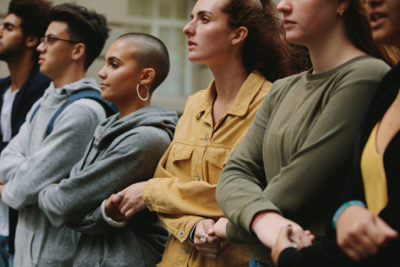3 years after #MeToo: the benefits of online disclosure

The study Slachtoffers van seksueel geweld en seksueel grensoverschrijdend gedrag onder de radar (Victims of sexual violence and hidden, transgressive sexual behaviour) focuses on the motivations and expectations of victims when they share their experience of sexual violence and transgressive sexual behaviour publicly and online (online disclosure). The research also examined the responses from society and the effects of that on the victims. Furthermore, the findings were converted into a step-by-step plan with concrete tools for the writing and online sharing of a victim’s experience.
Why do victims choose online disclosure?
The key element of online disclosure is processing the victim’s experience and providing relief for emotions such as feelings of shame. This can be realised by “writing away” the experience, by breaking the silence and making the taboo around sexual abuse discussable. Another important motivation is the desire to help others. By being able to mean something for another person, negative experiences can be converted into something positive. Finally, victims also list creating awareness and seeking recognition and informal justice (viral justice).
The focus is on the victim’s experience and not on the perpetrator
In October 2017, the #MeToo movement arose. This initially focused on film producer Harvey Weinstein but was subsequently picked up on by the general public. E-shaming – taking revenge by shaming a perpetrator online – received a lot of attention in this regard. Contrary to expectation, e-shaming was scarcely found during the study. The perpetrator is hardly ever the focus of online disclosure, instead, the focus is mainly on the victim’s experience. Furthermore, there appears to be little support in Dutch society for e-shaming, irrespective of the type of crime and the consequences for victims and perpetrators.
The importance of the responses to online disclosure
A survey under the Dutch population revealed that, in general, society is not very positive about participation (liking, sharing or responding to) with respect to online disclosure. The group with the most positive attitude towards the online sharing of a victim’s experience is younger, active on social media and, to a large extent, feels dependent on social media. An analysis of the actual responses revealed that these are overwhelmingly positive. In the case of positive responses, the victims feel heard, supported, believed and strengthened, which in turn increases their self-confidence. Negative responses, such as victim blaming, incomprehension or disbelief, are painful and give victims a feeling that they are not taken seriously. This can be experienced as more harmful than the actual victim experience. The lack of response – in more than one-third of cases – also has a negative effect: victims do not feel heard or think that society considers their experience unimportant.
Opportunities and risks of online disclosure of unwanted sexual experiences
People who share their story online, state a number of opportunities in this regard: they have control over what, where and with whom they share something, there is a distance to the readers and it is possible to interact and come into contact with fellow victims. As risks, they state the development of misunderstandings due to a lack of non-verbal communication and, contrary to the above-mentioned perceived sense of control, the loss of control over their own story and how others share this on the internet without the victim’s permission.
Step-by-step plan for online disclosure at SlachtofferWijzer.nl
Based on the research, a step-by-step plan for online disclosure has been developed. This provides victims of sexual violence with concrete tools for sharing their experiences online. This step-by-step plan (in Dutch) can be found on the SlachtofferWijzer (Victim Guide) of Fonds Slachtofferhulp (Victim Support Fund). A guidance document for professionals and relatives (in Dutch) has also been developed.
Follow-up study
A follow-up study has now been started. This will include a comparison between victims of sexual violence and transgressive sexual behaviour who share their experience online, and the group of victims that does not do that. This follow-up study will be carried out under the leadership of NSCR and is part of the Victim Research Program, which was partly established by and jointly realised with Fonds Slachtofferhulp.
Publication details and further reading
Van den Berg, C.J.W. & Gorissen, M. (2020). Slachtoffers van seksueel geweld en seksueel grensoverschrijdend gedrag onder de radar; onderzoek naar de achtergronden en effecten van viral justice en e-shaming door slachtoffers van seksueel geweld en seksueel grensoverschrijdend gedrag. NSCR/VU.
Read the interview with a victim (in Dutch) at Fonds Slachtofferhulp.
Share this article
Actuele berichten

